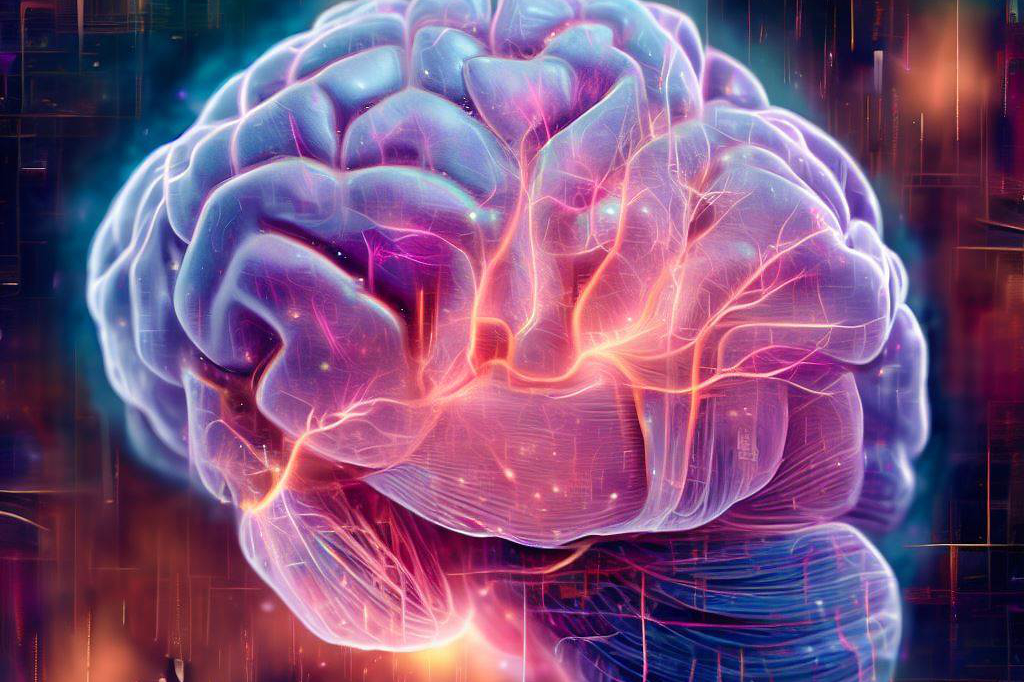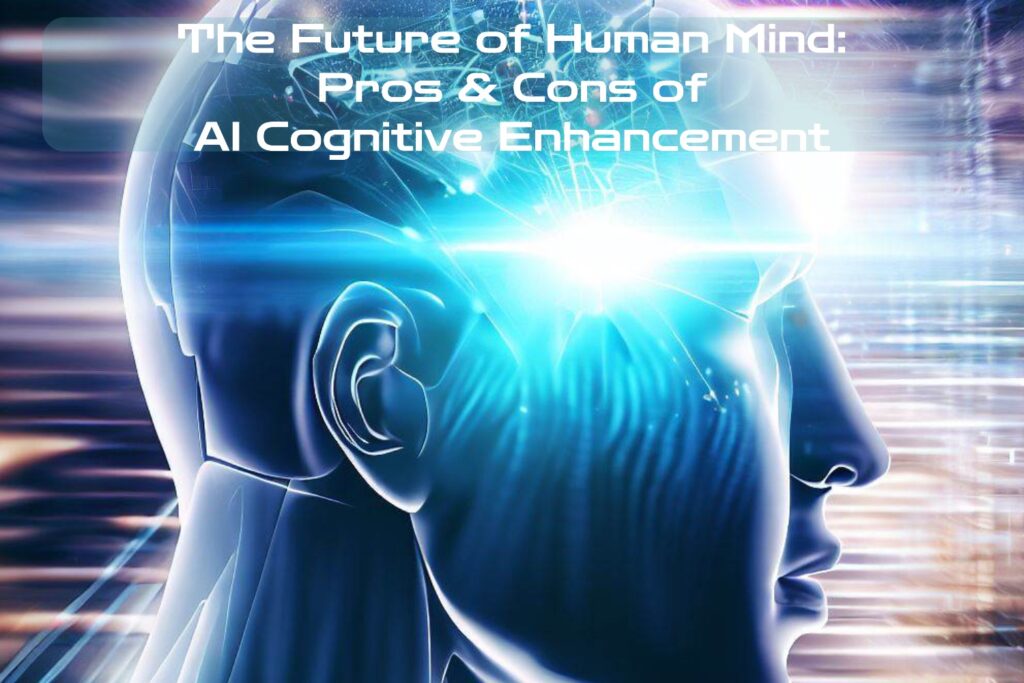Cognitive enhancement through AI is a cutting-edge discipline that has the potential to revolutionize the way we think and work. This field of study involves the use of artificial intelligence (AI) to enhance human cognitive abilities, including
- memory,
- learning,
- decision-making skills,
- creativity,
- and innovation.
The goal is to amplify human intelligence and productivity to an unprecedented level.
Definition of Cognitive Enhancement through AI
Cognitive enhancement through AI refers to the use of computer-based systems and technologies that aim to augment or improve human cognitive performance. These systems can include
- advanced algorithms,
- machine learning techniques,
- neural networks,
- data analysis tools,
and other forms of computational intelligence.
By leveraging these technologies, researchers hope to create a seamless interface between humans and machines that will facilitate higher levels of cognition.
Importance of Cognitive Enhancement in Modern Society

The importance of cognitive enhancement in modern society cannot be overstated. As we face increasingly complex challenges in all aspects of life – from scientific research and education to business management and healthcare – there is an urgent need for new strategies that can help us keep up with the pace of change.
By enhancing our cognitive abilities through AI-based systems and technologies, we can gain a competitive edge that will enable us to solve complex problems more efficiently than ever before. Furthermore, as we age or suffer from mental illness or injuries that affect our cognition, these advancements have shown great promise in restoring lost mental capacity or function back into our everyday lives.
Potential Benefits & Drawbacks
While the potential benefits associated with cognitive enhancement through AI are manyfold—increased productivity at work or daily tasks leads to economic gains for individuals as well as societies at large- there are also several potential drawbacks worth considering carefully as this field continues its research.
Some ethical concerns may arise regarding the fairness associated with access to cognitive enhancement technologies, others may argue that dependence on such systems could lead to implicit biases in decision making.
Additionally, the impact on social relationships as well as mental health outcomes should be taken into consideration as technology moves towards a more integrated role in our daily lives. In the following sections, we will explore these topics in further detail and examine the opportunities and challenges presented by cognitive enhancement through AI.
Potential Benefits of Cognitive Enhancement through AI

Improved Memory and Learning Capabilities
One of the most significant potential benefits of cognitive enhancement through AI is improved memory and learning capabilities. AI can help individuals better retain information through advanced algorithms that can predict which information they are likely to forget.
By analyzing patterns in how people learn, AI can customize learning experiences based on individual needs, making retention much easier. Additionally, AI can help users recall information more effectively by providing real-time access to relevant data and contextual clues.
Increased Productivity and Efficiency in Work and Daily Life

AI-powered cognitive enhancement has the potential to improve productivity across a range of industries, from healthcare to finance to manufacturing. By automating tasks traditionally performed by humans, AI frees up valuable time for more critical tasks requiring human expertise.
Additionally, AI can help optimize workflows, reducing delays and streamlining processes that typically bog down employees. In daily life, household chores such as grocery shopping or meal planning could be streamlined using virtual assistants that understand purchasing habits and dietary requirements.
Better Decision-making Skills and Problem-solving Abilities

AI-powered cognitive enhancement can also lead to better decision-making skills thanks to more substantial data analysis capabilities. Data-driven decision-making ensures businesses have accurate insights into business performance, allowing them to make smarter decisions based on real-time insights rather than intuition alone. In personal life, this technology could assist individuals in making informed decisions related to healthcare or financial issues based on individualized data analysis.
Enhanced Creativity and Innovation

While many fear that machines will take over jobs that require creativity or innovation, this may not be entirely true after all because cognitive enhancement through AI has the potential to actually boost creativity by enabling inspiration from a wealth of knowledge libraries that otherwise would not be readily accessible without spending a lot of time researching different topics. AI has the power to find patterns and connections between different data points that a human brain might not recognize alone. This can lead to new ideas, products, or services and ultimately drive innovation.
Improved Mental Health Outcomes

AI-powered cognitive enhancement can also potentially improve mental health outcomes. Accessible mental health care is a widespread problem; however, AI tools can quickly identify changes in mood or behavior that could indicate a potential problem before it becomes more severe.
Additionally, AI chatbots can offer counseling services to individuals without access to traditional therapy while maintaining anonymity. Cognitive enhancement through AI offers many potential benefits for individuals and society as a whole.
These include improved memory and learning capabilities, increased productivity and efficiency in work and daily life, better decision-making skills and problem-solving abilities, enhanced creativity and innovation, as well as improved mental health outcomes. However, alongside these benefits comes the potential for drawbacks that must also be carefully considered before implementing such technologies widely.
Ethical Concerns Regarding the Use of AI for Cognitive Enhancement

One of the primary ethical concerns surrounding cognitive enhancement through AI is the potential for technological advances to exacerbate existing inequalities in society. Those who have access to advanced AI technology and can afford it may have a significant advantage over those who do not.
This could lead to an even wider gap between the rich and poor, as well as disparities in educational and employment opportunities. Another ethical concern is related to privacy.
As individuals rely more heavily on AI systems for cognitive tasks, they must provide personal information that could be collected and used for other purposes. This creates a risk of data breaches, hacking, and misuse of personal information.
There is concern about the possibility of programming biases into these systems. If programmers unknowingly or knowingly include their own biases in the algorithms used to develop cognitive enhancement tools, it could further perpetuate inequality or discrimination in society.
Risks Associated with Dependence on AI for Cognitive Tasks

Dependency on AI technology for cognitive tasks also poses risks to individuals’ mental health and well-being. Relying solely on technology can lead to decreased critical thinking skills and problem-solving abilities, as well as decreased creativity due to reduced exposure to diverse ideas and perspectives.
There is also a risk that individuals may become over-reliant on these systems, leading them to neglect critical thinking or decision-making skills that are necessary for independent functioning in society. Additionally, excessive use of these tools could lead to physical health problems such as vision impairment or carpal tunnel syndrome from extended use of computers or other devices.
Potential Negative Impacts on Social Relationships

Another potential drawback associated with cognitive enhancement through AI is the impact it could have on social relationships. Relying too heavily on technology for communication purposes could lead individuals to disconnect from face-to-face interactions with others, leading them to feel isolated and disconnected from their peers.
Additionally, if people with cognitive enhancements use these technologies to gain an unfair advantage in social situations, it could lead to resentment or even exclusion from social groups. Furthermore, the overreliance on technology could further exacerbate existing societal problems such as cyberbullying or online harassment.
The anonymity provided by online interactions can lead to harmful behaviors that would not occur in face-to-face interactions. As individuals become more dependent on technology for social interaction, we must be careful to ensure that it does not further isolate individuals or facilitate harmful behavior.
Unequal Access to Cognitive Enhancement Technology
One of the most significant potential drawbacks of cognitive enhancement through AI is unequal access to these technologies. If only a select few have access to these tools, it could create a society where some are significantly more intelligent than others. This could create a power imbalance and exacerbate existing inequalities based on race, class, and socioeconomic status.
Additionally, unequal access could harm progress in fields such as science and medicine if only specific individuals have access to the latest enhancements. This would limit the potential for scientific discovery and progress by restricting who has access to the tools necessary for groundbreaking research.
Overall, while cognitive enhancement through AI has tremendous potential benefits, there are also significant drawbacks that need careful consideration before widespread adoption of this technology takes place. By addressing these concerns early on in technological development, we can work towards minimizing negative impacts while maximizing positive outcomes in society.
The Future of Cognitive Enhancement through AI
Advances in technology that could further enhance cognitive abilities

The future of cognitive enhancement through AI is promising, with ongoing research and development aimed at improving the technology. One potential area for advancement is the use of brain-computer interfaces (BCIs) to link the human brain directly to machines. This technology has already been used to help people with disabilities interface with computers and could be adapted for cognitive enhancement purposes.
Additionally, advancements in machine learning algorithms could lead to AI systems that are better able to understand and adapt to individual user needs, making cognitive enhancement even more effective. Another potential area for advancement is the integration of virtual and augmented reality (VR/AR) technologies into cognitive enhancement systems.
VR/AR technologies can create immersive environments that provide users with new ways of interacting with information and data. For example, a VR-based system could be used to simulate complex scenarios or environments, allowing users to practice decision-making skills in a safe and controlled way.
Potential for widespread adoption and integration into daily life
As cognitive enhancement technology becomes more advanced, it is likely that it will become more widely available and integrated into daily life. One potential application is in education, where cognitive enhancement systems could help students learn more effectively by providing personalized feedback or adapting content to individual learning styles. Similarly, in healthcare, these systems could be used as a tool for rehabilitation or to improve mental health outcomes.
In employment settings, cognitive enhancement systems could be used to increase worker productivity by reducing fatigue or providing real-time support during complex tasks. Additionally, these systems may have implications for military training or other high-stress environments where decision-making skills are critical.
Implications for education, employment, and healthcare

The widespread adoption of cognitive enhancement technology raises important questions about its impact on society as a whole. One concern is the potential for unequal access to these systems, particularly if they are expensive or require specialized training to use effectively.
This could create a divide between those who have access to cognitive enhancement technology and those who do not, further exacerbating existing social inequalities. Additionally, there may be ethical concerns around the use of AI for cognitive enhancement purposes.
For example, if cognitive enhancement technology is used to improve job performance, it could lead to a situation where workers are expected or required to use these systems in order to remain competitive. This raises questions about whether such requirements are fair or whether they place undue pressure on individuals.
While cognitive enhancement through AI offers many potential benefits, it also raises important ethical and societal questions that must be addressed. As this technology continues to evolve and become more integrated into daily life, it will be important for policymakers and researchers alike to ensure that its impact is carefully considered and managed in a responsible way.
Final Thoughts
Importance of Continued Research to Better Understand the Impact of AI on Human Cognition

It is imperative to continue researching the impact of AI on human cognition. The technology is rapidly advancing and has enormous potential as well as risks for society.
Researchers need to study how much cognitive enhancement through AI can impact human cognition positively or negatively. We need a deeper understanding of how it affects mental health outcomes and social connections.
Responsible Use and Regulation of Cognitive Enhancement Technology

As we move forward with cognitive enhancement through AI, it is critical that we do so responsibly. There needs to be regulation in place for ethical standards and responsible use of these technologies in terms of distribution, accessibility, affordability, and monitoring their safety impact over time.
The development should come along with an equal distribution strategy that ensures everyone has access to these technologies regardless of their economic or social status. While there are many potential benefits associated with cognitive enhancement through AI technology, there are also significant ethical concerns related to its usage that require further consideration by experts across various fields, such as healthcare professionals or policymakers alike, before being fully implemented into our day-to-day lives without causing harm in ways unintended by those who created them!

C M, a seasoned editor, journalist, and consultant, is deeply fascinated by the convergence of technology, space, and the future of humanity.
With a particular interest in transhumanism, futurology, and the philosophical and ethical dimensions of these domains, C M serves as the lead contributor to TranscendSphere and SpaceSpotlight.
When not penning insightful articles on these rapidly evolving fields, C M indulges in their love for podcasts and books, proudly embracing their status as a ‘Happy Nerd Extraordinaire!’





